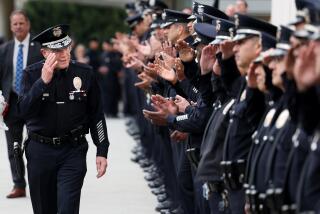Retired Officer, 96, Kills Ill Wife and Then Himself
- Share via
Like a lot of retired cops before him, Joe Dircks decided to end it all with a gun.
There’s nothing official yet, but the neighbors think they know why.
Dircks was 96--the oldest surviving veteran of the Los Angeles Police Department. His wife of 72 years was suffering from a lengthy illness. He may have wanted her pain to end, and he may not have wanted to go on without her. That’s what the neighbors think.
Whatever the reason, Joe and Lillie Dircks lay down together on the bed in their small home on Griffith View Drive on Thursday, and Joe fired two shots from his old pistol. The first bullet killed Lillie and the second killed him.
The neighbors weren’t surprised.
“He indicated often that there was no way he would allow himself or his wife to be put in a convalescent home,” said Bob Ryerson, who lives down the street. “He’d say, ‘Not as long as I’ve got a gun.’ ”
Dircks’ decision to take his own life--using a gun--was not that unusual. More than 300 active and retired police officers commit suicide every year nationwide, most of them using the sort of pistol they carried during their careers.
It was almost 73 years ago when Joe Dircks--a strapping 22-year-old from Stratton, Colo.--was sworn in as an officer in the LAPD’s mounted patrol. The city was a lot smaller then--about 350,000 people--and a lot quieter. Dircks’ principal jobs were handing out parking tickets and patrolling major events, like movie premieres.
Dircks and his chestnut quarter-horse, Bob, covered a beat that ranged along Grand Avenue between 5th and 9th streets.
“Bob was a fine horse,” Dircks recalled a few years ago. “He used to walk behind me and sneak apples from a fruit stand. He’d stand out in front of the Biltmore and kick his hoofs until the girls came out to give him sugar. If you go there today, on the Grand Avenue side, I bet you’d see where he beat on the sidewalk.”
It was while on horse patrol that Dircks met Lillie, the sister of a parking lot attendant. They married in 1924.
Two years later, the mounted patrol was disbanded. Dircks, a crack shot who had won dozens of awards for his marksmanship, helped establish the department’s first shooting range. Rising through the ranks, he retired from the department as a lieutenant in 1943--he said it was “about the time we started getting some smog”--and got a job as chief of security at the Douglas Aircraft Co. plant in Long Beach.
In recent years, Joe and Lillie, three years his junior, became the social focus of their comfortable neighborhood in Atwater Village.
Joe was charming and gregarious, Lillie was kindly and quiet.
He would walk the neighborhood in a Stetson hat, handing out produce from his garden to whomever he encountered. Cornering a neighbor or two, he would spin yarns about Los Angeles in the 1920s, when characters like “Postman Smith”--a mail carrier who fed Bob cough drops--hung out at 5th and Grand, and bands of Gypsies camped along the banks of the Los Angeles River.
“Boy, could that guy tell a story,” Ryerson said. “He could make a trip to the mailbox sound like an adventure.”
Joe and Lillie often invited neighbors over to their cozy house to play cards, and that was when Lillie shone.
“She was a devil at cribbage,” said a next-door neighbor, who identified herself only as Gayle. “Lillie was usually quiet, but you couldn’t cross her path at cards.”
In recent months, however, a lot of the joy went out of the couple’s lives.
The death of a boyhood friend was a severe blow to Joe, whose once robust frame was withering with age. Reduced to tears, he frequently took refuge in his home.
“When you have no children, such losses can be devastating,” Ryerson said. “It was hard to hear a strong man like that sobbing.”
Then Lillie, whose weakened legs forced her to use a wheelchair for the last five years, developed a severe kidney infection.
“Joe was very much in love with her, and it killed him to see her that way,” Ryerson said. “I suspect he concluded that he was no longer able to help her.”
More to Read
Sign up for Essential California
The most important California stories and recommendations in your inbox every morning.
You may occasionally receive promotional content from the Los Angeles Times.













